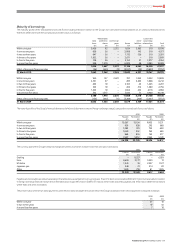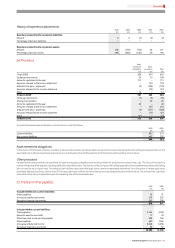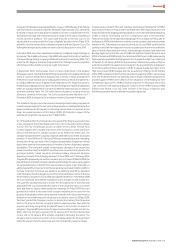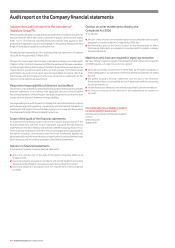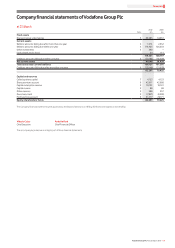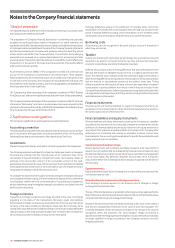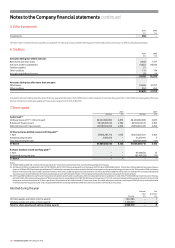Vodafone 2010 Annual Report Download - page 117
Download and view the complete annual report
Please find page 117 of the 2010 Vodafone annual report below. You can navigate through the pages in the report by either clicking on the pages listed below, or by using the keyword search tool below to find specific information within the annual report.
Financials
Vodafone Group Plc Annual Report 2010 115
in respect of mobile phones purchased before 1 August 1996 (the date of the Federal
Communication Commission’s Specific Absorption Rate standard (‘FCC standard’));
ii) injuries in respect of mobile phones alleged not to have complied with the FCC
standard; and iii) fraud and misrepresentation in respect of the sale or marketing of
mobile phones in question. The cases have returned to the trial court to be
adjudicated in accordance with the Court of Appeals’ decision, and on 3 May 2010,
plaintiffs in the four actions filed amended complaints with the Superior Court. The
defendants are expected to answer or move to dismiss the actions in June 2010.
In October 2004, one of our subsidiaries, Vodafone 2, instigated a legal challenge to
an enquiry (‘the Vodafone 2 enquiry’) by HMRC with regard to the UK tax treatment
of its Luxembourg holding company, Vodafone Investments Luxembourg SARL (‘VIL’),
under the CFC Regime. Vodafone 2 argued that the CFC Regime was incompatible
with EU law and the Vodafone 2 enquiry ought to be closed.
In September 2006, the European Court of Justice determined in the Cadbury
Schweppes case (C-196/04) that the CFC Regime would be incompatible with EU law
unless it could be interpreted as applying only to wholly artificial arrangements
intended to escape national tax normally payable (‘wholly artificial arrangements’).
On 22 May 2009, the Court of Appeal (‘CoA’) held that the CFC Regime could be so
interpreted by reading a new exemption into the CFC Regime in respect of subsidiaries
which are ‘actually established’ in another EU Member State and carry on ‘genuine
economic activities’ there. The CoA ruled that the Vodafone 2 enquiry should be
allowed to continue on this basis. The CoA’s decision became final when, on 17
December 2009, the Supreme Court refused Vodafone 2 permission to appeal.
The Vodafone 2 enquiry and other enquiries involving similar holding companies in
Luxembourg are ongoing. The outcome of these enquiries, including whether further
legal proceedings will be required to ultimately resolve them, is uncertain at this
stage. We carried provisions of £2.2 billion (2009: £2.2 billion) in respect of the
potential UK corporation tax exposure at 31 March 2010.
On 12 November 2007 the Company became aware of the filing of a purported class
action complaint in the United States District Court for the Southern District of New
York by The City of Edinburgh Council on behalf of the Lothian Pension Fund
(‘Lothian’) against the Company and certain of the Company’s current and former
officers and directors for alleged violations of US federal securities laws. The
complaint alleged that the Company’s financial statements and certain disclosures
between 10 June 2004 and 27 February 2006 were materially false and misleading,
among other things, as a result of the Company’s alleged failure to report on a timely
basis a write-down for the impaired value of Vodafone’s German, Italian and Japanese
subsidiaries. The complaint sought compensatory damages of an unspecified
amount and other relief on behalf of a putative class comprised of all persons who
purchased publicly traded securities, including ordinary shares and American
depositary receipts, of the Company between 10 June 2004 and 27 February 2006.
The plaintiff subsequently served the complaint and, on or about 27 March 2008, the
plaintiff filed an amended complaint asserting substantially the same claims against
the same defendants on behalf of the same putative investor class. Thereafter an
additional plaintiff, a US pension fund that purportedly purchased Vodafone ADRs on
the New York Stock Exchange, was added as an additional plaintiff by stipulated
order. We believe that the allegations are without merit and filed a motion to dismiss
the amended complaint on 6 June 2008. By judgment entered on 1 December 2008
the court dismissed the amended complaint for lack of subject matter jurisdiction.
The plaintiffs subsequently filed a motion for reconsideration of that dismissal
arguing that the court overlooked the claims of the US pension fund, as to which
there had been no subject matter jurisdiction challenge. On 9 April 2009 the court
granted that motion to the extent that it sought reopening of the action for the
purpose of adjudication of the claims asserted on behalf of the US pension fund but
denied the motion with respect to the dismissal of Lothian’s claims. On 20 May 2009,
the Court granted the Company’s motion to dismiss the claims of the US pension
fund on the grounds that the complaint failed to plead securities fraud with the
requisite specificity, but granted the plaintiff leave to file a motion to amend its
complaint. The plaintiff filed a motion for leave to amend the complaint on 26 June
2009, which the Company opposed. On 22 January 2010 the Court denied that
motion and on 30 January 2010 entered a judgment dismissing the action. The
Company has not been served with a notice of appeal within the time permitted
under the relevant civil procedure rules and now considers the case to be closed.
Vodafone Essar Limited (‘VEL’) and Vodafone International Holdings B.V. (‘VIHBV’)
each received notices in August 2007 and September 2007 respectively, from the
Indian tax authorities alleging potential liability in connection with alleged failure by
VIHBV to deduct withholding tax from consideration paid to the Hutchison
Telecommunications International Limited group (‘HTIL’) in respect of HTIL’s gain on
its disposal to VIHBV of its interests in a wholly-owned subsidiary that indirectly holds
interests in VEL. Following the receipt of such notices, VEL and VIHBV each filed writs
seeking orders that their respective notices be quashed and that the tax authorities
take no further steps under the notices. Initial hearings have been held before the
Bombay High Court and in the case of VIHBV the High Court heard the writ in June
2008. In December 2008 the High Cour t dismissed VIHBV’s writ. VIHBV subsequently
filed a special leave petition to the Supreme Court to appeal the High Court ’s dismissal
of the writ. On 23 January 2009 the Supreme Court referred the question of the tax
authority’s jurisdiction to seek to pursue tax back to the tax authority for adjudication
on the facts with permission granted to VIHBV to appeal that decision back to the
High Court should VIHBV disagree with the tax authority’s findings. On 30 October
2009 VIHBV received a notice from the tax authority requiring VIHBV to show cause
as to why it believes that the tax authority does not have competent jurisdiction to
proceed against VIHBV for the default of non-deduction of withholding tax from
consideration paid to HTIL. VIHBV provided a response on 29 January 2010. VEL’s
case continues to be stayed pending the outcome of the VIHBV hearing. VIHBV
believes that neither it nor any other member of the Group is liable for such
withholding tax and intends to defend this position vigorously.




